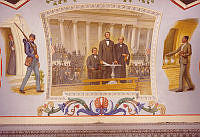Rubenstein Center Scholarship
To the Depositors of the Freedmen's Savings & Trust Co.
Notice published in the New National Era from Frederick Douglass upon the bank's failure
TO THE DEPOSITORS OF THE Freeman's Savings and Trust Co.
The recent legislation of Congress, so amending the charter of of [sic] the Freedman's Savings and Trust Company, as to place the institution upon a broader and firmer basis, and give to its Trustees a larger measure of discretion and control of its management, may be well enough made the occasion for a brief statement of facts and circumstances which have a bearing upon the legislation in question and upon the future existence and success of the Freedman's Bank.
It is very evident that Congress was animated in its legislation by a generous desire to conserve and strengthen an institution of known usefulness to the people in whose interest it was created.
In regard to the condition of this corporation, certain facts have already come to public knowledge, through the publication of the report of Mr. Meigs, the Bank Examiner.
It is not necessary to disguise or explain away by false process the facts therein stated. It is known that on the first of January, 1874, our liabilities exceeded our assets to the extent of $217,000, and it is also known that nothing has occurred since that time to materially diminish the space between these assets and liabilities, though it is due to state that several considerable loans which were supposed, at the time the Report was made, to be bad, have turned out to be good loans.
This deficit, now admitted and never denied by the undersigned, is very easily accounted for, and it may serve a good purpose to state the cause of its existence.
First. The managers of the "Freedman's Savings and Trust Co." have unfortunately endeavored to make the Freedman's Bank compete with older and better-established institutions of the kind, in attracting and securing a large amount of deposits by holding out the inducement of a larger per centage [sic] of interest than was warranted by the earnings of the Bank.
Of course any corporation, nation or family which spends more than it earns, will in due time find its coffers exhausted.
Second. Another cause of this deficit of $200,000 is found in the fact that the former managers of the Freedman's Savings and Trust Co. undertook to do too much work in another direction; impressed as they were with the sense of the many benefits of savings institutions among the freedmen of the South, they were tempted into a sort of banking missionary movement.
They started, established and supported branches of the institution in remote places in the Southern States, and where it was almost impossible that they could become speedily self-sustaining.
Third. It cannot be doubted that a third cause has in a large measure operated against the success of the Freedman's Bank, and this cause happens to be one which it is most difficult to deal with, because it is inherent in the enterprise itself, and no wisdom which the managers of the Bank can exercise, can counteract and remove.
This institution conspicuously and pre-eminently represents the idea of progress, and elevation of a people who are just now emerging from the ignorance, degradation, and destitution entailed upon them by more than two centuries of slavery.
A people who are hated not because they have injured others, but because others have injured them. This feeling of caste, this race malignity, has naturally enough taken about the same offence at the Freedman's Bank, as it did at the existence of the Freedman's Bureau.
It is as desirous to destroy the former as it was to destroy the latter.
Fourth. Still another and greater source of evil has been the senseless runs made from time, to time, upon the Bank. These have compelled the withdrawal of large sums of money from very safe and profitable investments, and have diverted the regular business of the Bank from making money for its depositors, to the work of obtaining the means of meeting the demands of these disastrous panics. The Freedman's Bank has been subjected to no less than than [sic] three of these raids during the last eighteen months.
The run made upon the Bank by the failure of Jay Cooke & Co., cost us not less than fifty thousand dollars, and required the withdrawal of a half million of dollars from safe and profitable investments.
Add to these causes the general prostration of business, the great loss of confidence in all moneyed institutions, the disturbed condition of affairs, especially in the District of Columbia, where most of our loans have been made, and you will easily understand why the Freedman's Bank is now under a heavy strain, and found it necessary to seek protection in the recent amendments to its charter.
In respect to the future of the Bank, some of the main sources of danger and ruin have been entirely removed.
The trustees governed by an increasing concern for the safety of their depositors rather than for large profits in the way of interest, have abandoned their unwise competition with others in the offer of a high per centage [sic] of interest, and have now resolved to pay only such a rate as the net earnings of the Bank will warrant them in paying.
They have also given up their wild and visionary schemes of banking, and have abandoned the policy of establishing branches in remote corners of the country.
They will now establish none where there is not a very strong likelihood of their becoming self-sustaining. Not only have they discarded the policy of extension, they have adopted the policy of closing up as speedily as is convenient and practicable the non-paying branches now in operation. They are not only for decreasing the number of branches, but also the number of employees, and for reducing the salaries of their agents to the lowest point consistent with securing the services of good men.
With this retrenchment in expenses, with wise and vigorous management, and with the returning confidence of our people, it is believed that the Freedman's Savings and Trust Company, which has already been a powerful instrument in promoting the moral, social, and intellectual welfare of our people will survive and flourish despite the machinations of its enemies.
The effect of the legislation recently enacted upon the Bank will naturally inspire confidence. It is indirectly a strong endorsement of the honesty and the ability of the trustees of the institution.
It puts the destiny of the Freedman's Savings and Trust Company more completely than heretofore within their power and discretion. It devises an honest method of keeping the institution in continued and successful operation, while it at athe same time enables it to accomplish all the objects usually sought in suspension. It completely divorces the past from the present and future. It separates the old from the new, and allows the dead past to bury its dead. It aims to protect the new depositor from all the mistakes and misfortunes connected with the management and past condition of the Bank.
For the interests of the old depositors it enables the trustees to hold their securities as long as may be necessary to reap the full amount of interest they are capable of drawing, and then allows the trustees to fill up the chasm which may exist between assets and liabilities.
It puts it in the power of the officers and agents of the Freedman's Savings and Trust Company to say with confidence and truth to all our old depositors, give us time and we will pay you every dollar due you from the company.
To the new depositors it enables us to say with even more confidence, you may deposit with safety and profit. You are neither affected by past losses, nor past mismanagement.
Your money shall not be in any way mixed up with the old, nor taken to pay old debts. It shall be held as special, and invested for your special benefit.
In one aspect this bill may be said to place the old Bank in liquidation, while it at the same time creates a new one. It preserves the old body, but informs it with new life, and gives it a better assurance of continued existence.
What is now needed is wisdom, courage, skill, and determination. With these the Freedman's Savings and Trust bank may be made not only a success in itself, but a grand means of success to the colored people of the South, to whom it has already taught important lessons of industry, economy, and saving.
The history of civilization shows that no people can well rise to a high degree of mental or even moral excellence without wealth. A people, uniformly poor, and compelled to struggle for barely a physical existence, will be dependent and despised by their neighbors, and will finally despise themselves. While it is impossible that every individual of any race shall be rich – and no man may be despised for merely being poor – yet no people can be respected which does not produce a wealthy class. Such a people will only be the hewers of wood and drawers of water, and will not rise above a mere animal existence. The mission of the Freedman's Bank is to show our people the road to a share of the wealth and well being of the world. It has already done much to lift the race into respectability, and, with their continued confidence and patient cooperation, it will continue to reflect credit upon the race and promote their welfare.
It has long been a bitter complaint against the Freedman's Bank that it withdrew money from distant localities and invested it here at the capital. The bill which has now become a law has removed all ground of complaint on this point. It provides that loans shall be made in the vicinity of the different branches, so that the people who deposit their money may now feel assured that it will not be withdrawn to build up Washington, but will be employed to quicken industry and improve the condition of the country where it is collected. This feature of the bill alone goes far to recommend the Freedman's Savings and Trust Company to the confidence and favor of the colored people.
Frederick Douglass,
President.
Published in The New National Era, June 25, 1874





















